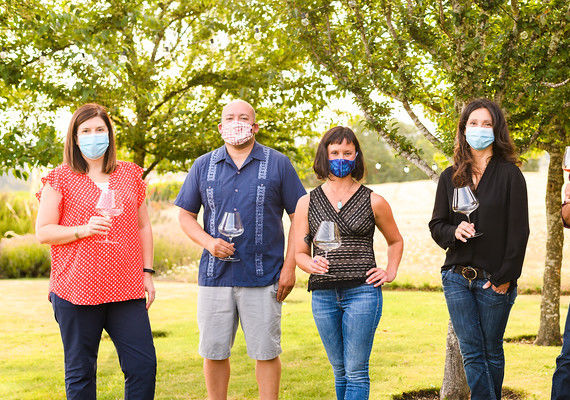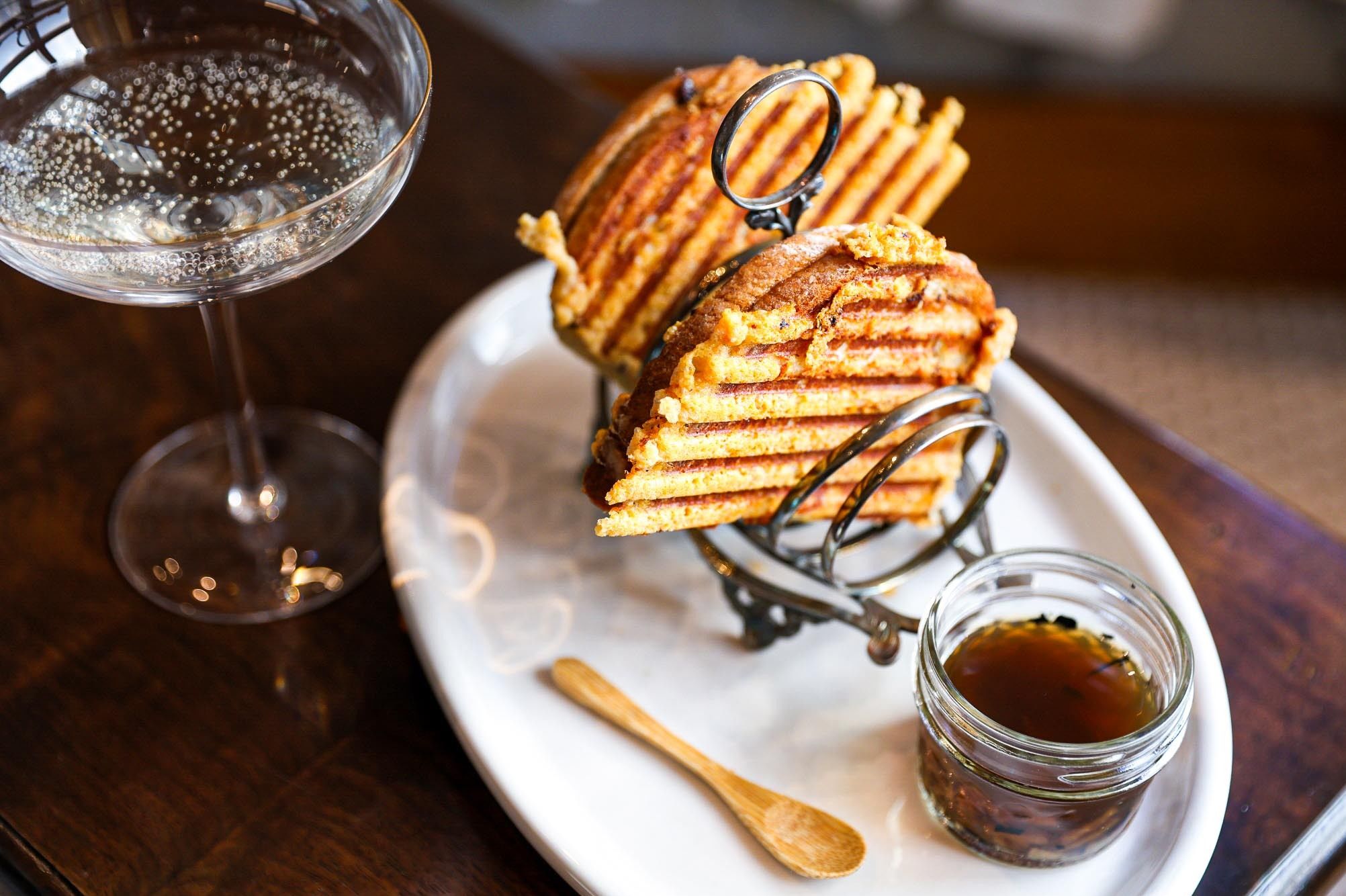Celebrating Hispanic Roots Highlights Willamette Valley Winemakers

Six Willamette Valley winemakers are teaming up for the inaugural Celebrating Hispanic Roots. From left to right: Carla Rodríguez, Sam Parra, Cristina Gonzales, Ximena Orrego, JP Valot, and Sofia Torres.
The Willamette Valley might be known for its Pinot Noir, but the average pinot drinker might not know that it’s also home to a diverse group of winemakers. Just as we enter harvest season, six Latinx winemakers from the Willamette Valley have teamed up for Celebrating Hispanic Roots/Raíces Unidas, a new winemakers’ event organized in honor of Hispanic Heritage Month that runs from September 15 to October 15.
The winemakers are Ximena Orrego of Atticus Wine in Yamhill; Carla Rodriguez of Beacon Hill Winery in Gaston; Sofia Torres of Cramoisi Vineyard in Dundee, Cristina Gonzales of wine label Gonzales Wine Company; Sam Parra of wine label Parra Wine; and Juan Pablo “JP” Valot of Valcan Cellars in Corvallis.
The event features two Zoom panels with all six winemakers on October 1st. Both panels are free, but participants must register in advance. The first panel is in English at 4 pm and will be moderated by Katherine Cole, wine writer and host of the James Beard award-winning food and beverage podcast Four Top. The second panel will be in Spanish at 6 pm, moderated by Roxy De La Torre, an award-winning bilingual reporter and producer and the founder of Somos Media.
During the entire month, each of the winemakers is offering a special package of wines, and 10 percent of the sales from each package will be donated to the Latino Partnership Program, which is part of the Oregon Community Foundation. The program funds leadership initiatives, education opportunities, and community connections for Oregon’s Latinx communities.
The idea for the Celebrating Hispanic Roots event came from Ximena Orrego. “I really wanted to celebrate the diversity of our cultures and backgrounds and share our personal stories,” Orrego said in a press release. “It was also very important for me to give back to our Spanish-speaking community here in Oregon.”
Orrego, born in Peru and raised in Venezuela, fell in love with Willamette Valley wine country on a visit with her husband in 2004, and the couple immediately decided to buy property there. Today, they live in a house they built themselves next to the vineyard, where they grow grapes for Pinot Noir and offer private wine tastings in English and Spanish.
Born in the Northern Mexican city of Torreon, Carla Rodríguez and her husband are wine growers that produce grapes for Pinot Noir, Riesling, Chardonnay, and Rosé of Pinot Noir. This year, for the first time ever, they’re also offering Albariño, a white wine typically grown in Spain and Portugal, in a nod to Rodríguez’s Hispanic heritage.
Juan Pablo “JP” Valot was born and raised in Mendoza, Argentina—the wine country of Argentina—and comes from a multigenerational family of winemakers. His wine package for Celebrating Hispanic Roots includes a white Malbec, the first of its kind in the country. The 2019 vintage earned 90 points from Wine Enthusiast.
Sofia Torres, born and raised in Mexico City, and her husband, grow grapes on their vineyard for Pinot Noir and rosé of Pinot Noir. On hot days, you can find her walking through the vineyard that she and her husband purchased on Mexico’s Independence Day in 2011, playing classical music and spraying chamomile tea on the grape leaves to prevent them from wilting.
Mexican-American winemaker Cristina Gonzales currently has two wines on offer: a Malbec and a red blend, both made in Portland using California grapes. Her red blend, The Revolutionary, is named after the Mexican revolutionary Emiliano Zapata, a figure who inspires her because of his mission to return land back to indigenous people.
Sam Parra’s family has been in the wine industry for three generations. His grandfather, who came from a family of farmers, immigrated from Jalisco to Napa Valley after World War II, where he worked as a grape farmer. Parra’s wines are available exclusively through his mailing list. He estimates that 70 percent of his clients for his first release, a Tempranillo, were Latino.
Many of the winemakers on the panel are leaders in their own right as well as advocates for the Latinx community, particularly for those who work on vineyards. With winemakers Miguel Lopez and the late Jesus Guillén, Torres co-founded AHIVOY, a nonprofit that helps Latino and Hispanic vineyard workers—or vineyard stewards, as AHIVOY calls them—gain wine education, professional development, and career opportunities. Through the nonprofit’s education program, vineyard stewards can take classes at Chekemeta Community College in Salem on winemaking and the business aspect of wine. When she’s not running her wine label, Gonzales serves as the secretary of AHIVOY, and she also sits on the organization’s education committee.
In the past, Sam Parra has volunteered with Salud, a Tualatin-based organization that helps seasonal workers on vineyards access medical and dental care. Now, Parra is the co-chair of AHIVOY, and he’s particularly interested in providing education and mentorship for vineyard stewards.
“My grandfather... always encourag[ed] his siblings and my generation, the grandkids, to pursue higher learning. He’s like, ‘Trust me, you don’t want to be in my shoes.’ He loved the agricultural side, but it just took a toll on his body,” Parra says. Along with helping with AHIVOY’s education program, Parra also mentors a vineyard steward who’s interested in starting his own label. There’s a racial divide between those who work in the vineyards and those who work in the cellars or in sales, Parra says—but there’s an increasingly large number of Latinx winemakers, cellarmasters, wine label owners, and winery and vineyard owners.
“I feel that a cellarmaster can set an example,” Parra says. “Maybe some vineyard workers that have just migrated to the area, and they get jobs at vineyards, because they know agriculture. They may not know how to farm grapes, but they know how to farm and labor in general, and they might have what my grandparents have: aspirations, goals, or ambitions for their family, for their little ones, to pursue something else.”
To learn more about the event, the winemakers, and the wines, visit celebratinghispanicroots.com or follow @celebratinghispanicroots on Instagram.




